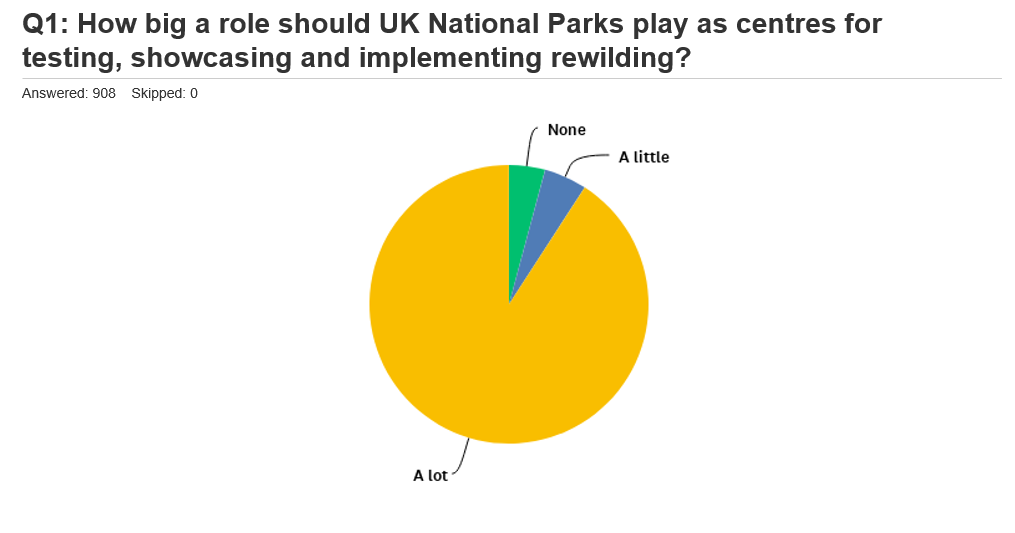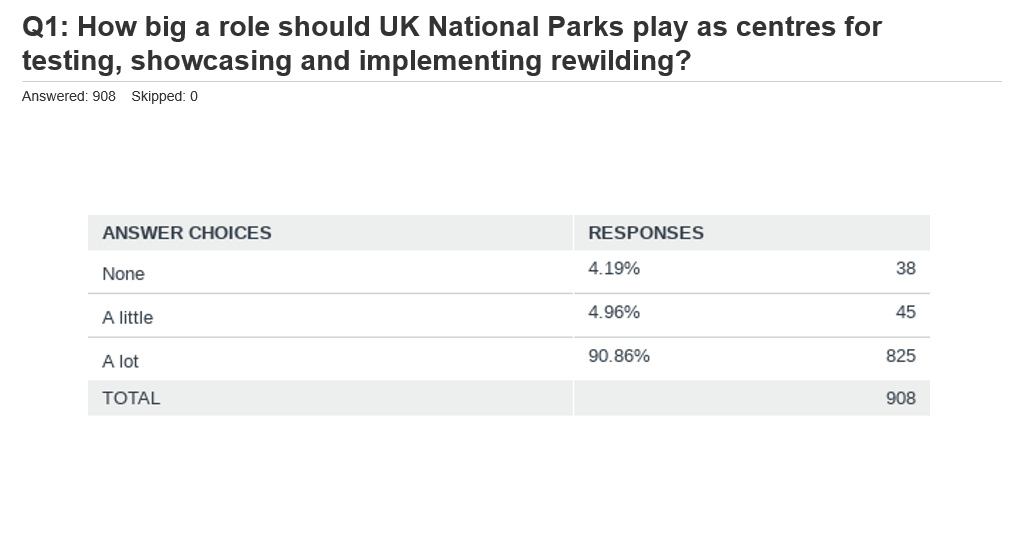I asked a simple question and in under six days 908 people responded:


Now that’s quite clear.
We have no way of knowing who these people were – the survey was promoted on social media and was open to any to answer (but that doesn’t mean that the respondents were anything like representative).
But the results are spectacular even if you imagine that they come from that narrow group of people who would claim to be nature conservationists. I’ll just leave that there.
Thank you for responding with such enthusiasm.
[registration_form]
A very good question and as you say Mark a very interesting response to it. The trouble is unlike most other countries in the world our National Parks are a total shame. They mean virtually nothing as far as conserving and protecting our wildlife and nature is concerned.
Almost every where one looks in this country nature is poorly protected by legislation and very feeble administration.
Alan is spot-on, across this country because through all our organization’s, private or commercial – we are screwing up the works – we can’t help it, because we have no knowledge of what the natural world wants, we have a good understanding of what we want. We are all amateurs, mere novices, yes people get degrees and appear on the TV, and we fall hook, line and sinker on their opinions, but no human on this planet has the slightest idea what nature is all about, because all of us are in that DNA connecting chain of life that facilitates evolution. We are simply not that smart – I wish we were!
The word rewilding I have no idea what that means, it’s a PR buzzword which individuals lock onto as our saving grace; it has differing connotations for every individual. For many organizations and many individuals it’s a passport to a fortune.
On this farm we are not rewilding, I hate that word and all it stands for, we are trying and I think succeeding in creating a living landscape for nature devoid of any human influence and occupation, I think it’s the purest ‘rewilding’ you can get. No one can walk the farm without guidance from one of us.
But that philosophy goes against the gain of populous rewilding thoughts, we create our National Park, and then do the worse thing possible, like Dracula’s victims we invite millions of Christopher Lee’s in. So we create not a nature paradise but a human playground.
I have simply no idea what an eco-tourist is, I’ve never met one, are they some sub-species bud-off from the rest of us, no they’re just people on holiday enjoying themselves, but eco-tourism is the setting trend, “come see nature, but you can do all the stuff you can do at home, don’t worry about disturbance, nature’s used to it”. – Bullocks!
I believe in one thing people on this planet have rights – but I passionately believe that nature also have those rights too, but they don’t have the voice to say to those disturbing dickheads – piss-off.
What is the definition of re-wilding? Is it total abandonment to nature with zero human interference – and, by inference, human access? Or is there some form of management plan with certain species given priority over others? I wonder what the respondents believed when taking part in the survey. As man has lived with, and against, nature for millennia I suspect the later. In which case is re-wilding a bit of a misnomer?
What do we really want? I fear I agree in part with Mr Bickerton although without the hysteria. And without the definition I share his dislike of the portmanteau word that promises much but means little.
Austringer – it’s a fair point. It’s a bit lie sustainable farming – what does that mean? I think your preferred definition od rewilding is definitely on the rewilding -lite (probably rewilding-very-lite) end of things but I agree that I’d be surprised if many of the enthusiastic majority wanted the immediate release of Brown Bears and Wolves in the Peak District.
This may be what we want to happen but given that almost all land in national parks belongs to somebody else much of it privately owned achieving this most laudable of aims looks at the moment like a very long shot. Especially as much of our uplands especially are currently managed purely for sporting reasons, a scandal I know but there it is.
Paul – except, anything that looks like it might be agriculture is propped up (aprticularly in the uplands) by your taxes. And with a switch to public money for public goods the taxpayer is king (and queen).
“the taxpayer is king”
Disneyland it is, then
I am really rather like Iolo when it comes to sheep ranching in the uplands it is an ecological disaster one only has to look at large parts here in mid Wales, Snowdonia, the Lakes, or Yorkshire dales and the rout of nature is completed by our lack of natural woodland in the uplands and the curse that is grouse shooting. My bet is natural and public good will not stretch to these or beavers and lynx.
There’s a huge elephant in the corner of the National Parks room and it’s called the New Forest. Over half owned by the State on behalf of all of us, it has every designation under the sun, is arguably the most important terrestrial site for nature conservation in England and is one of the few places in lowland England where natural processes are able to come anywhere near functioning. I’m not so much surprised as angry that it is hardly ever mentioned – not surprising, it raises far too many difficult questions for all land managers, conservationists as much as productionists. Even it’s governance raises awkward questions: Elliot Morley, as Minister, revised the Forestry Commission’s brief as managers to give priority to the the natural and cultural heritage as first priority, and the Verderers do not have any duty to be ‘reasonable’ – had they had, the forest would have by now been chipped away by the accumulation of apparently trivial developments.
The New Forest is a relatively new incomer to the National Parks. It has been there for all of fifteen years. It is still finding its feet in the quagmire of legislation and deregulation which gets added to.
I like the New Forest. It has the most amazing trees without any twigs below about 6 feet. And not too many conifers. The problem is that they built it too close to Southampton, Christchurch, Bournemouth and Poole and most of the population decamps to the forest at every opportunity. There is some method in the madness of Fairy Forest Trails and the like as they tend keep people focused around hotspots so that the footfall in the more interesting bits is reduced. The traffic is horrible for much of the time, unless you like being stationary. Best to visit on winter weekdays and never on Boxing Day.
One of the statutory requirements for National Park designation is consideration of opportunities they afford for open-air recreation, having regard both to their character and to their position in relation to centres of population.
National Parks are supposed to provide health promoting access to open space for everyone, so there is an expectation that there will be a significant catchment population within easy travelling distance.
I can’t speak for all National Parks, but a quite large area of the Peak is owned by National Trust,
Water authority, Forestry Commision, English Nature,or the National Park authority, along with some sympathetic private landowners.
I know NT have gone for a continuation of Driven Grouse shooting on parts of the Snake moors, which many thought the wrong decision. i supported most of their reasoning at the time, but if this does not work out i would hope that they follow the Re-Wilding path.
The above mentioned landlords need to start thinking radically about this, especially when new leases are in the offing, if they are not on board with it, there is currently little hope for the myriad of smaller landowner/ farmers to join the movement.
After all, what is to say it won’t just become “one big snack bar for Magpies”…